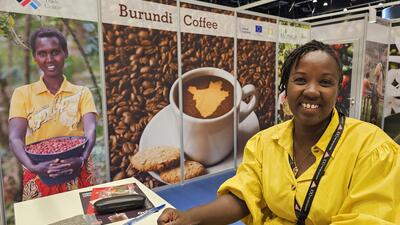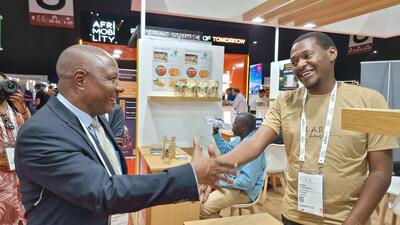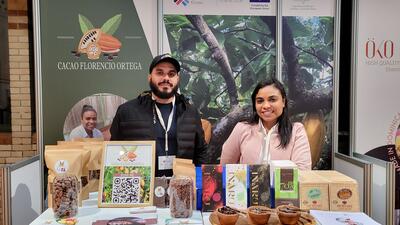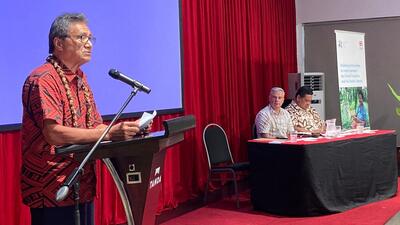
UKTP Supports Ugandan Coffee Companies to Attend the London Coffee Festival to Unlock Market Opportunities
In April, the International Trade Centre (in collaboration with the Uganda Coffee Federation) supported 6 Ugandan coffee producers to participate and exhibit at the week-long London Coffee Festival, through its UK Trade Partnerships programme (UKTP).
Taking place at Newman Breweries in the East of London, the festival drew coffee enthusiasts from around the globe to indulge in the rich aromas and flavors of their favorite brews. Visitors sampled an array of specialty coffees from different regions of the world including Uganda, with fine arabicas and robustas on display. Modern coffee roasting machines and technologies were also featured alongside presentation of cutting-edge techniques.
The London Coffee Festival is about more than just coffee, however —it’s a celebration of culture, community, and sustainability. Throughout the 4 days, attendees had the opportunity to engage with coffee growers and producers and learn about the journey of the humble coffee bean from farm to cup. Workshops on ethical sourcing, fair trade practices, and environmental conservation underscored the importance of responsible coffee consumption in an increasingly interconnected world.
Uganda Companies and BSOs at the LCF
|
Company/ BSO Name |
Products |
|
Mwanyi Terimba Limited |
Robusta -Green beans |
|
Coffee World Ltd |
Arabica – Green beans |
|
Kampala domestic store ltd |
Robusta – Green beans |
|
The Edge Trading LTD |
Robusta – Green beans |
|
Mountain Harvest |
Arabica – Green beans |
|
Clarke Farm representing Large-scale Coffee Farmers Association |
Arabica – Green beans |
The Ugandan companies came away from the Festival enriched, and with broader business networks that will support their companies’ future growth. Interviews with representatives of the companies revealed key learnings and highlights from the experience:
- Networking Opportunities: The festival provided an excellent platform for networking with industry peers, stakeholders, and potential partners.
“Engaging in meaningful conversations with fellow exhibitors, coffee enthusiasts, and industry experts allowed us to forge new connections and explore potential collaborations”
-Amos Kasigi of The Edge Trading.
- Brand Visibility and Exposure:
“Our presence at the festival significantly boosted our brand visibility and exposure within the coffee community. Through interactive exhibits and tastings of our brewed coffee at the festival, we showcased our products and commitment to quality of Uganda’s coffee”
-Ian Clarke of Uganda Large Scale Coffee Framers Association.
- Market Insights and Trends: Participating in the London Coffee Festival provided valuable insights into emerging market trends, consumer preferences, and industry innovations. Observing the latest advancements in coffee technology, brewing techniques, and sustainability practices helped Uganda coffee exporters to be abreast of market developments and adapt their strategies accordingly.
- Consumer Engagement and Feedback: Interacting directly with festival attendees, allowed Ugandan companies to gather valuable feedback on their coffee and brand perception. Understanding consumer preferences, pain points, and expectations firsthand will enable the companies to refine their offerings and enhance the overall customer experience.
“We were able to explain the quality of our coffee to our buyers and with this, we managed to sell 50 bags of coffee outside the festival.”
-Nathan Kotaki of Mountain Harvest U Ltd
- Educational Opportunities: The festival offered a diverse range of educational sessions, workshops, and seminars covering various aspects of the coffee industry. Attending companies enriched their knowledge, deepened their understanding of key issues, and got valuable insights that will inform their future business operations.
A Visit to Small Roasters
After the Festival, Uganda companies made a series of visits to small roasters in the UK coffee market.
The Ugandan producers highlighted how these visits yielded several valuable lessons that deepened their understanding of the industry and will inform their approach to coffee sourcing, production, and marketing. These included:
- Focus on Quality and Craftsmanship: Small roasters prioritize quality and craftsmanship, often handcrafting their coffee in small batches to ensure optimal flavor and freshness. Witnessing their meticulous attention to detail and commitment to excellence reinforced the importance of quality-driven practices in delivering an exceptional coffee experience to consumers.
- Embrace Sustainability and Ethical Sourcing: Many small roasters in the UK place a strong emphasis on sustainability and ethical sourcing practices, sourcing their beans directly from farmers or cooperatives that prioritize environmental stewardship and fair labor practices. Uganda is a specialty coffee origin and therefore has greater opportunities in this market segment especially if producers can strive for sustainable agriculture, minimize waste, promote social responsibility ethical sourcing and embed these as core brand values.
- Celebrate Diversity and Innovation: The Ugandan team observed that small roasters were characterized diversity and innovation, with the small roasters showcasing a wide range of coffee varieties, blends, and flavor profiles. Exploring their innovative approaches to roasting, blending, and flavor experimentation inspired them to embrace creativity and experimentation in their own coffee offerings.
- Stay Nimble and Adaptive: In a rapidly evolving market landscape, small roasters demonstrate agility and adaptability, responding quickly to changing consumer trends, market dynamics, and industry challenges. Learning from their ability to innovate, iterate, and pivot, when necessary, reinforced the importance of staying nimble and responsive in navigating the complexities of the coffee market.
Overall, the visit to small roasters provided valuable insights into the principles of quality, sustainability, innovation, community engagement, and adaptability that underpin success. These are important lessons to Ugandan coffee exporters targeting the UK market especially the small roasters’ segment.















